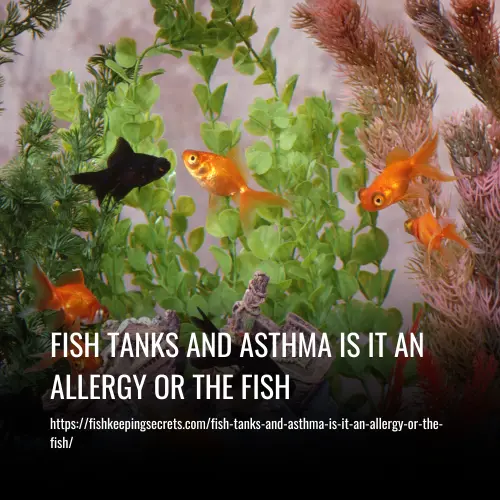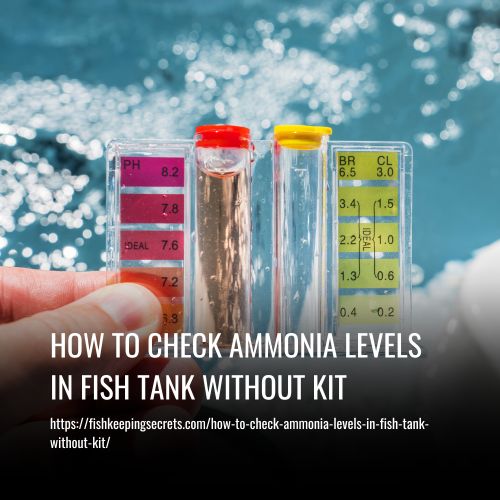Fish Tanks And Asthma Is It An Allergy Or The Fish
This post contains affiliate links. As an Amazon Associate, we earn from qualifying purchases.
Fish tanks can potentially cause breathing problems if they are not properly maintained. A warm and moist environment inside the tank can promote the growth of mold, which can release spores into the air and trigger respiratory issues. It is important to regularly clean the tank, perform water changes, and ensure proper water chemistry to prevent mold growth and maintain a healthy environment for both the fish and the owner.

Can A Fish Tank Cause Allergies
Yes, a fish tank can cause allergies if it is not properly cared for. Mold can easily grow on fish tanks and bowls, which can trigger allergic reactions in some individuals. Additionally, allergies to polymers like silicone, which is used for sealing aquariums, can also be problematic for sensitive individuals.
It is important to maintain a clean and well-maintained fish tank to prevent the growth of allergens and ensure the health and well-being of both the fish and the owner.
Understanding The Basics Of Fish Tanks
Fish tanks, also known as aquariums, are manmade enclosures that house water and aquatic creatures such as fish, turtles, or snails. These tanks are equipped with filtration systems to maintain water quality and remove waste.
In order to provide a suitable environment for the aquatic creatures, fish tanks may also include heaters, lighting, and other accessories that mimic their natural habitats. Understanding the basics of fish tanks is essential for successful ownership and care of aquatic animals.
The Connection Between Fish Tanks And Breathing Problems
While fish tanks can be enjoyable and visually appealing, it’s important to be aware of potential breathing problems associated with them. Airborne pollutants like dust, mold, and germs can be released into the atmosphere, leading to respiratory issues.
Additionally, the buildup of waste materials in the aquarium, including fish waste and uneaten food, can contribute to poor air quality. To mitigate these concerns, regular cleaning and maintenance of the tank, along with proper ventilation, can help promote a healthy environment for both the fish and humans.
Symptoms Of Breathing Problems Due To Fish Tanks
Breathing problems caused by fish tanks can manifest in various symptoms, depending on the duration and severity of exposure. These symptoms may include coughing, wheezing, difficulty breathing, chest tightness, and nasal congestion.
In severe cases, it can even lead to respiratory conditions such as asthma attacks. It is important to address any breathing issues promptly and ensure proper ventilation in the fish tank to prevent these problems.
Who Is At Risk Of Developing Breathing Problems
Breathing problems caused by fish aquariums can affect anyone, but there are certain groups that are more at risk. Individuals who already have respiratory diseases such as asthma, allergies, or chronic obstructive pulmonary disease (COPD) are more vulnerable.
Additionally, those who are sensitive to pollutants in the air, such as smoke, dust, and chemicals, are also at a higher risk of developing breathing problems. It’s important for individuals in these groups to take extra precautions and ensure proper ventilation and air quality in their environment.
How To Prevent Breathing Problems Due To Fish Tanks
To prevent breathing problems due to fish tanks, follow these steps:
1. Regular cleaning and maintenance
Maintain a clean fish tank by performing regular water changes, cleaning the filter, and keeping the tank free of waste and pollutants. This will help maintain good air quality.
2. Proper ventilation
Ensure proper ventilation in the room where the fish tank is located. Open windows or use a fan to circulate the air and prevent the buildup of airborne contaminants. Consider using an air filter to further remove any pollutants.
3. Choose the right location
Place the fish tank in a well-ventilated area away from busy streets and direct sunlight. This will help prevent the accumulation of pollutants and maintain good air quality around the tank.
4. Regular check-ups
If you are at a high risk of breathing issues, such as asthma or allergies, make sure to visit your doctor regularly. Regular check-ups can help detect any respiratory problems early and prevent them from worsening.
By following these preventive measures, you can ensure a healthy and safe environment around your fish tank, minimizing the risk of breathing problems.
FAQs
Yes, fish tanks can cause mold if they are not cleaned properly. If there is food or organic matter build-up in the tank, it can create a suitable environment for mold to grow. Mold in fish tanks can be harmful to both humans and animals. It is important to clean the tank regularly, remove all food and debris, and do a thorough cleaning at least once a week to prevent mold growth. If you notice any signs of mold, take immediate action to clean it.
While fish tanks can potentially make you sick, most healthy people won’t get ill from exposure to the bacteria in a fish tank. However, those with weakened immune systems should be cautious. Regular cleaning and maintenance of the tank, avoiding unnecessary contact with the water, and washing your hands after handling the tank can help prevent illness. It’s best for individuals with weak immune systems to avoid fish tanks altogether.
Yes, a smelly fish tank can make you sick. The bacteria that cause the bad smell can release toxins into the water, which can be harmful if you’re exposed to them for too long. To prevent sickness, clean out your tank by removing any dead fish or debris and adding fresh water and white vinegar to kill the bacteria and eliminate the odor. Regularly changing the filter and washing your hands after handling fish or cleaning the tank can also help keep you and your family safe.
Fish tank mold is not necessarily harmful to humans, but it can be dangerous to fish. Mold can cause respiratory infections, skin irritation, and even death in fish. It is important to remove mold from the tank immediately to keep your fish safe. Mold spores are present in the air and can start growing in a fish tank when they find a moist surface. The mold colonies can spread and contaminate other surfaces in the tank. To keep your tank clean and safe, it’s important to regularly clean and maintain it.
A fish tank can potentially cause respiratory problems if it is not properly maintained. Poor water quality and dirty tanks can release harmful bacteria into the air, leading to respiratory infections. Additionally, overcrowding the tank can result in high ammonia levels, which can also cause respiratory issues. However, as long as the tank is kept clean and well-maintained, it should not pose any significant risks to your respiratory health.
You can get a few diseases from fish tanks, such as fish tank granuloma, which is a skin infection that occurs when a cut or scratch on your skin comes into contact with the tank water. Another disease is ichthyophthiriasis, a parasitic infection that causes itching and irritation. It’s important to maintain good hygiene when handling fish tanks to prevent these diseases.
Keeping a fish tank in your home may actually increase the risk of developing asthma or worsening existing symptoms. Dust and particles from the aquarium can become airborne and trigger asthma attacks, while the bacteria in the tank can cause respiratory infections. It is important to take precautions when cleaning the fish tank and ensure that the area around it is well-ventilated if you have asthma.
There is some evidence to suggest that keeping fish tanks in the bedroom can lead to respiratory issues. This is because the water in the tank can release small particles into the air, which can irritate the lungs and cause breathing difficulties. It’s important to properly ventilate the room and regularly clean the tank to minimize any potential health risks.
Having a fish tank in the bedroom can pose potential health risks such as respiratory issues, allergies, and infections. One specific infection is called aquarium granuloma, which is caused by bacteria in the contaminated water and can be contracted through contact with the water. It is important to maintain proper hygiene and cleanliness when owning a fish tank in the bedroom to minimize these risks.
If you decide to keep a fish tank in your bedroom, there are a few precautions you should take. First, make sure to clean the tank regularly to prevent any buildup of waste or algae that could lead to respiratory issues. It’s also a good idea to use a high-quality air filter to help filter out any allergens or pollutants that may be released from the tank. Finally, be mindful of not overstocking the tank with too many fish, as this can lead to poor water quality and potential health problems for the fish.
Yes, aquarium granuloma can cause breathing problems. The bacteria that causes the infection can spread through the water and enter the lungs, leading to inflammation and difficulties in breathing. It is important to seek medical attention if experiencing respiratory symptoms after handling aquariums or aquarium water.
Having a fish tank in the bedroom can provide several benefits. Watching fish swim can be soothing and calming, making it easier to fall asleep. Studies have also shown that having a fish tank can help reduce stress and anxiety. So, having a fish tank in your bedroom can create a peaceful and tranquil environment.
Conclusion
In conclusion, fish tanks and asthma can be a tricky combination, but with the right precautions and awareness, it is possible to enjoy the beauty of these aquatic marvels without triggering any allergic reactions.
So, if you or your loved ones have asthma and a love for fish, don’t fret! Take the necessary steps, consult with your healthcare professional, and dive into the world of fishkeeping with confidence.






